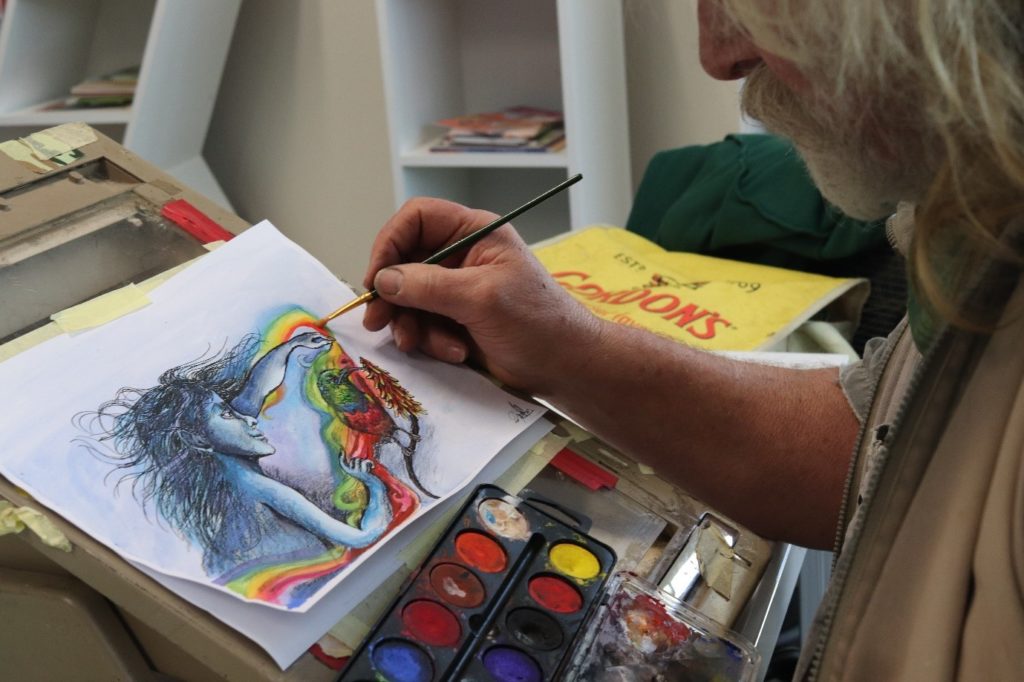By PHETOLO PHATSIBI
Eager teams of volunteer creatives converged on the Amazwi South African Museum of Literature last week to create a rich collection of new Eastern Cape picture books.
The Rhodes University Centre for Social Development (CSD) and Amazwi organised the Makhanda Book Dash event to celebrate Amazwi’s 20th and CSD’s 40th anniversary.
Each team had a writer, an illustrator, and a designer and all teams worked in solidarity, filling Amazwi with creative energy and inspiration.
CSD director Nicci Hayes said the project encouraged children to read more books by creating books they can relate to. The books, written in isiXhosa, Afrikaans and English, reflect local children’s diverse cultural and linguistic heritages.
“We felt that with the help of local writers, illustrators, and translators, the books that we make would resonate more with the children of Makhanda. We sent out a call, and we got 50 volunteers in a matter of a week or two.”
The books explore friendship, environmental issues, and identity, encouraging local children’s creativity, education, and social skills.
“Book Dash gave us ideas on how we should run things, but we had to make it our own a little bit – the process has just been fantastic,” Hayes said.
The first group of writers, editors, and illustrators met up on Thursday, 26 August, at Amazwi to start designing high-quality children’s books and finish the next day. A second group met on Saturday and Sunday.
“Some participants couldn’t physically attend because of Covid-19, so we’ve tried to make things work through Zoom and WhatsApp groups. We are so grateful to all the volunteers who’ve given up their time,” Hayes said.
“We are hoping that the books will make a huge difference and that they will reach as many kids out there as possible. In the long run, if finances allow, we will print as many copies as we can. While we are still planning to make copies, the books will be freely available online for everyone to download.”
Zondezile Matshoba, director of the public and education programme at Amazwi South African museum of literature, said a plan was being hatched to turn the books into audiobooks, as well as Braille.
Meet some of the volunteer illustrators and writers behind the project:
Basil Mills, illustrator
Basil Mills is a senior tech and environmental education officer for the education public programme at Amazwi. He believes in harnessing children’s creativity through visual learning and art. Some of the learners he works with have learning disabilities. Basil said art could be used as a form of expression for children with learning disabilities. In addition to his artistic skills, Basil has extensive knowledge of South African natural and human history, battle re-enactments, animal rescue and rehabilitation work and restoration projects.
Danika Lensley, illustrator
Danika Lensley is a Grade 8 learner at Victoria Girls High School. At Makhanda Book Dash, she illustrated a book called Fighting in the Farmyard that explores the theme of social skills. Danika loves to draw and wants people to know that age shouldn’t determine one’s capabilities. “I want people to respect and take my artwork seriously without judging it based on my age,” she said.
Lalu Mokuku, writer
Selloane Mokuku, aka Lalu, is a writer who is passionate about languages, “mainly because it is a way we create meanings”. Her book Naught, Knotty and Naught explores the concept of trans-language and how it shapes the South African education system. English is the communication medium in most South African schools, but South Africa is multilingual. Lalu emphasised the importance of translating English books to other languages.
Lalu is an experienced theatre-maker, storyteller, academic, writer and performer. She has worked with and for young people internationally through UNICEF and Save the Children UK. In her day job, she facilitates teaching and learning at Rhodes University’s Drama department, focusing on theatre for social transformation.
About the journalist
I am Phetolo Phatsibi, a 23-year-old post-graduate journalism student at Rhodes University. I completed my Bachelor of Arts degree in Communications (with a major in strategic corporate communications) from North-West University. The media I produce represents the cultural and political changes that South Africa has gone through over the years. I love to document things that evoke human emotions, raise questions and create debates for social change. I love photography and draw a lot of my inspiration from photographers like Steve McCurry and Vivienne Maeir.


